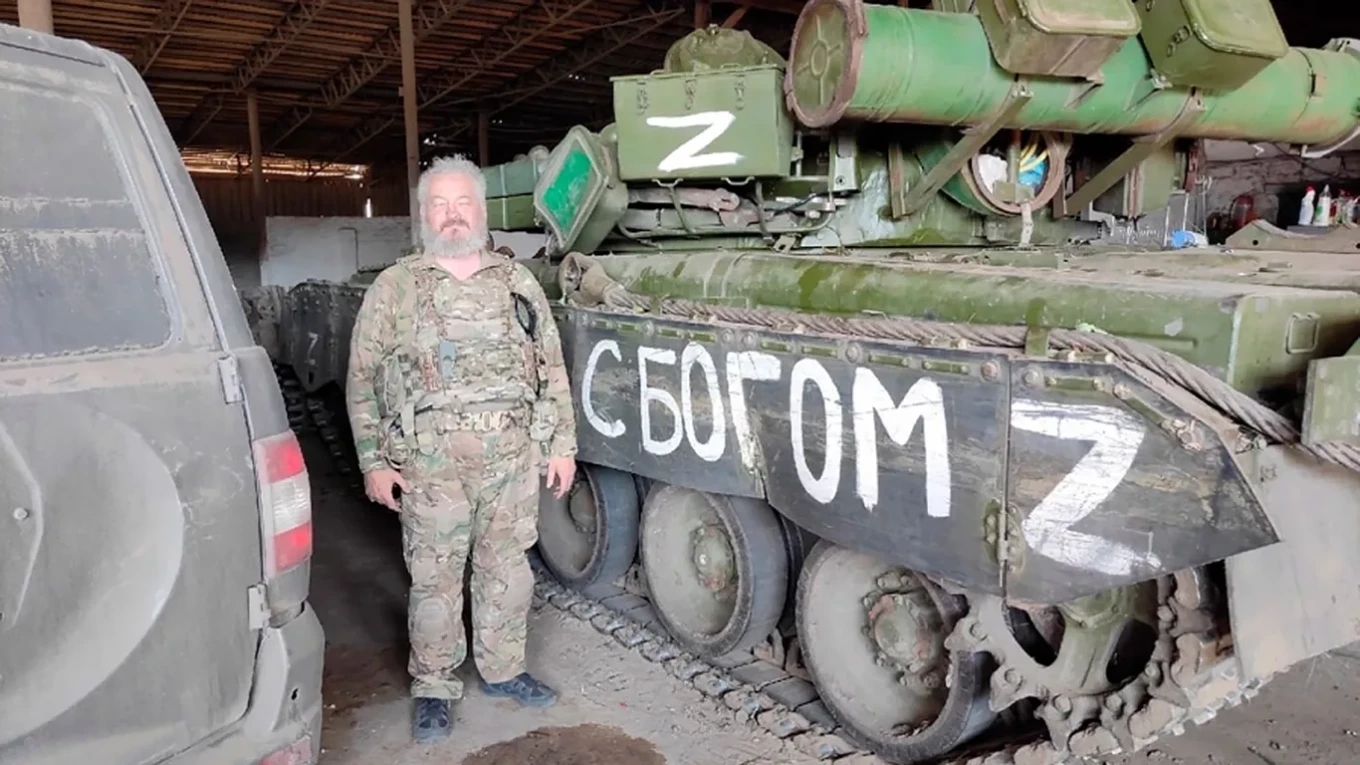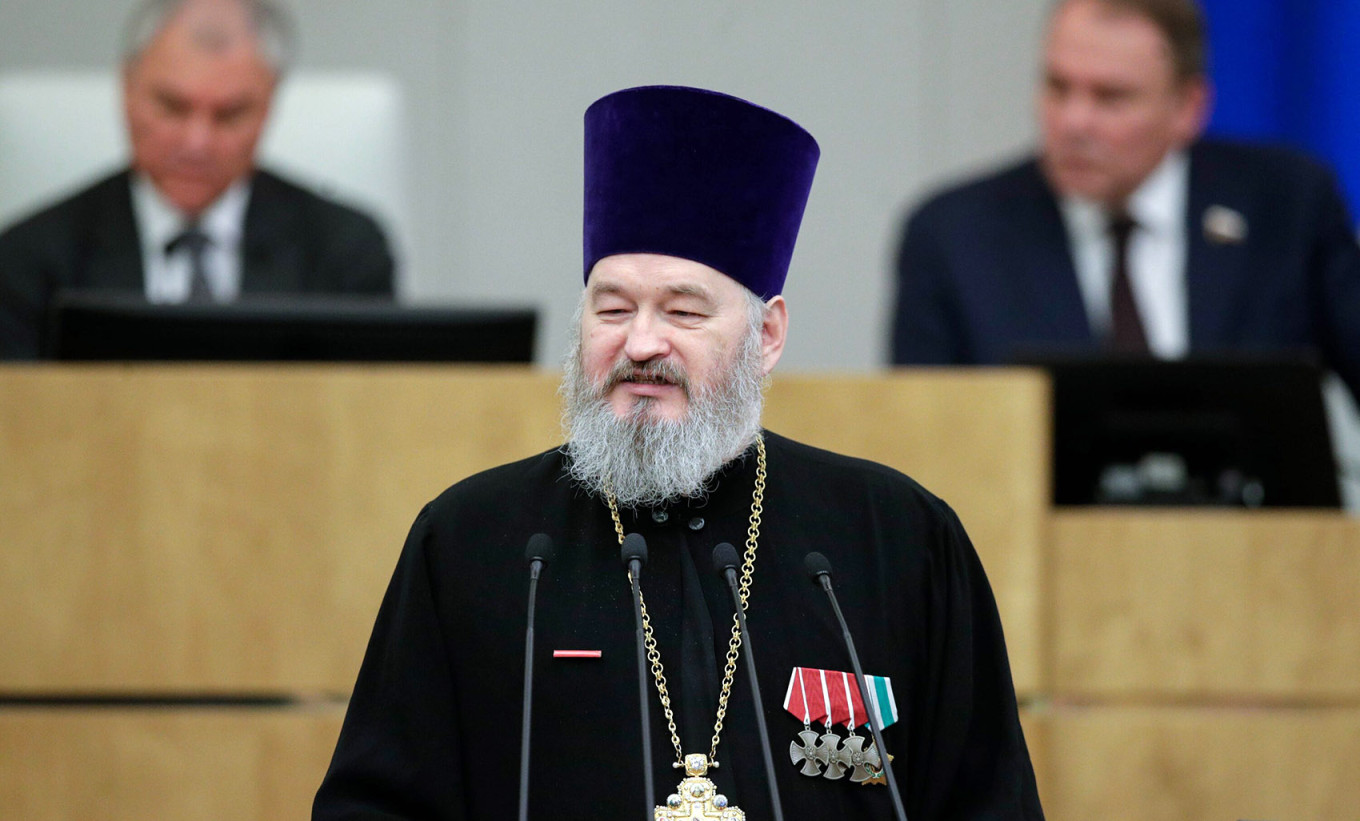Training the 'Warriors of Victory': Russian Orthodox Church Marks 3 Years of War in Ukraine

“For almost three years, the main topic for our entire nation has been the special military operation. And, of course, the Russian Orthodox Church is always with its people,” Metropolitan Kirill, the Church official who oversees its work with Russia’s military and law enforcement agencies, said Friday.
Since the start of Russia's full-scale war on Ukraine in February 2022, the Russian Orthodox Church has fervently stood behind the Kremlin's policies and worked to bolster military morale. On the war's third anniversary, the Church commemorated the date with militarized worship and events across the country.
Over the past three years, clergy members have baptized 42,000 soldiers on the front lines, built 140 field churches, and dispatched 2,000 Orthodox priests to the battlefield, according to Church representatives. At least 27 military units have been named after Orthodox saints, including the Seraphim of Sarov Battalion, named for one of Russia's most revered religious figures.
“You can't send people to their deaths simply by talking about material [benefits], allowances, subsidies and privileges. You need to rely on something more profound,” Andrei Afanasyev, a war correspondent and host on the Orthodox TV channel SPAS, said of the Church's role in wartime.
To provide this “more profound” support, the Church created the position of head military priest in areas where Russian troops are fighting. Since April 2023, this role has been held by St. Petersburg Archpriest Dmitry Vasilenkov, who has made multiple trips to occupied Donetsk since 2014.

“Every war has two key ingredients: weapons and ideas. Because weapons don't fire on their own — they fire because of an idea,” said Archpriest Andrei Kordochkin, who was suspended from the Church after speaking out against the invasion.
“If the state provides the weapons, the Moscow Patriarchate provides the ideas. More precisely, it takes the ideas generated by state ideology and imbues them with sacred meaning,” he told The Moscow Times.
Vasilenkov has framed the conflict as a battle of good versus evil, alleging that Ukrainian soldiers are being trained to be “beasts” while declaring it the Church's mission to instill the “light of God in the hearts of our warriors.”
The Church has also moved to formalize its role within the military. Last year, it introduced a special course for military chaplains. This year, the Moscow Patriarchate and the Defense Ministry started developing a federal law defining the legal status of military clergy.
Speaking before the lower-house State Duma in January, Vasilenkov claimed that military chaplains had successfully convinced 700 conscripts who initially refused to fight to return to the front lines.

He cited an instance in which 46 soldiers who had expressed a desire to flee "suddenly, as one, decided not to run and said, 'Send us back to the front, we will fight to the end'.”
Kordochkin also underscored the Church's role in mobilizing men who might not otherwise fight.
“In a normal state, a person cannot simply go and kill another person. Motivation is needed. Contract soldiers are motivated by money, prisoners by the promise of freedom, but beyond that, an mental component is required,” he said.
“This is where the Moscow Patriarchate steps in, saying that war is not a tragedy but the highest expression of the human spirit. If, for our grandparents, war was a horror they never wanted to recall, now, within this rhetoric, war is seen as the ultimate purpose of human existence,” he continued.
The Church's militarization efforts also extend to children.
In mid-February, a priest in the republic of Chuvashia led a master class for schoolchildren on making trench candles. At a church in Krasnodar, Sunday school students wove camouflage nets and collected “humanitarian aid” for soldiers.
In some regions, priests led "lessons in courage," patriotic sessions designed to instill respect for the military in children, ahead of Defender of the Fatherland Day — a holiday that honors members of the military — on Feb. 23.
In the Rostov region, first-grade students were taken to a local church, where a priest blessed amulets for soldiers. And in Khabarovsk, high school students sent greetings to Russian soldiers from St. Elizabeth Church ahead of Defender of the Fatherland Day.
“With their message, the students wanted to show that those waiting for our defenders on the home front pray to God to keep them safe and healthy,” the local diocese wrote .
Before the military holiday, memorial services were held in many Russian cities for soldiers killed during the war in Ukraine. Fallen troops were remembered in both the Black Sea resort city of Anapa and the Orenburg region bordering Kazakhstan.
“There are no dead before the Lord - every soul is alive in Him. And we see that these people lived with dignity, were loyal to their Motherland, and so we hope with faith that they have found their place in the Kingdom of Heaven,” Metropolitan Tikhon said during a funeral service in Oryol.
Kordochkin, the suspended anti-war priest, said that war has become “Russia's new civil religion.”
“In its classical sense, a civil religion is a set of rituals and beliefs that bind a society together, regardless of its religious affiliations. Here, the church, the state and military rhetoric intertwine into a single system,” he told The Moscow Times.
On Defender of the Fatherland Day, Patriarch Kirill laid a wreath at the Tomb of the Unknown Soldier near the Kremlin.
He praised the “exemplary consolidation of [Russian] society” and declared: “We believe that no external forces can defeat Russia — Russia has only ever been defeated by internal strife. But thanks to the actions of our President and our authorities, such a threat does not exist today.”
The Defense Ministry marked the holiday by sharing messages from religious leaders across faiths, including Orthodox priests, an Islamic Hazrat and a Buddhist lama. A male choir from occupied Mariupol's churches also congratulated the military in a Telegram post.
In the Arctic city of Murmansk, the Church of the Savior on the Waters opened Russia's first spiritual rehabilitation and sports center for military personnel. The three-story complex features sports halls, a conference room and a chapel dedicated to the ascetic Saint Varlaam of Keret that houses a reliquary containing a part of his relics.
Mining and metallurgy giant Norilsk Nickel funded the center, which is named “Defenders of the Fatherland.”
To mark the third anniversary of Russia's full-scale invasion of Ukraine on Monday, one of St. Petersburg's main cathedrals unveiled an expanded military-themed exhibition. A display will feature patches worn by soldiers in Ukraine, adorned with images of Jesus, the Virgin Mary and Saint George the Victorious, alongside an icon discovered during World War II.
“If the church once had the ability to maneuver, it is now fully embedded in the system of state power and military propaganda,” Kordochkin told The Moscow Times. “Today, unity within the church must be maintained not only in matters of faith but also in the socio-political sphere.”
A Message from The Moscow Times:
Dear readers,
We are facing unprecedented challenges. Russia's Prosecutor General's Office has designated The Moscow Times as an "undesirable" organization, criminalizing our work and putting our staff at risk of prosecution. This follows our earlier unjust labeling as a "foreign agent."
These actions are direct attempts to silence independent journalism in Russia. The authorities claim our work "discredits the decisions of the Russian leadership." We see things differently: we strive to provide accurate, unbiased reporting on Russia.
We, the journalists of The Moscow Times, refuse to be silenced. But to continue our work, we need your help .
Your support, no matter how small, makes a world of difference. If you can, please support us monthly starting from just $ 2. It's quick to set up, and every contribution makes a significant impact.
By supporting The Moscow Times, you're defending open, independent journalism in the face of repression. Thank you for standing with us.
themoscowtimes






